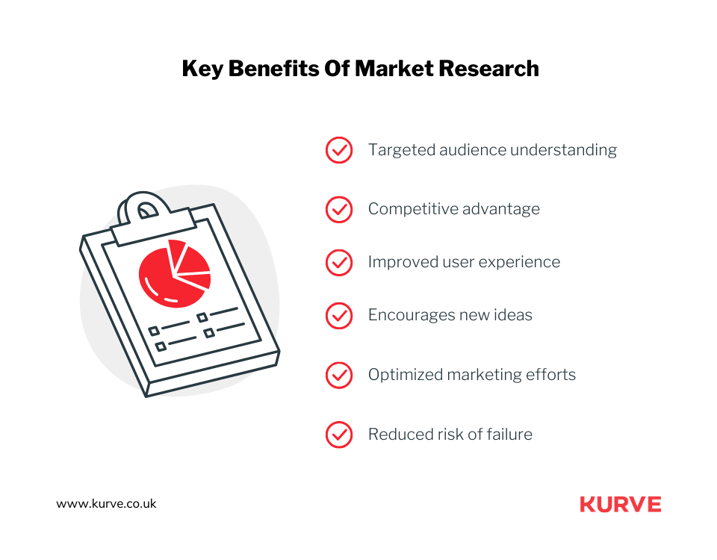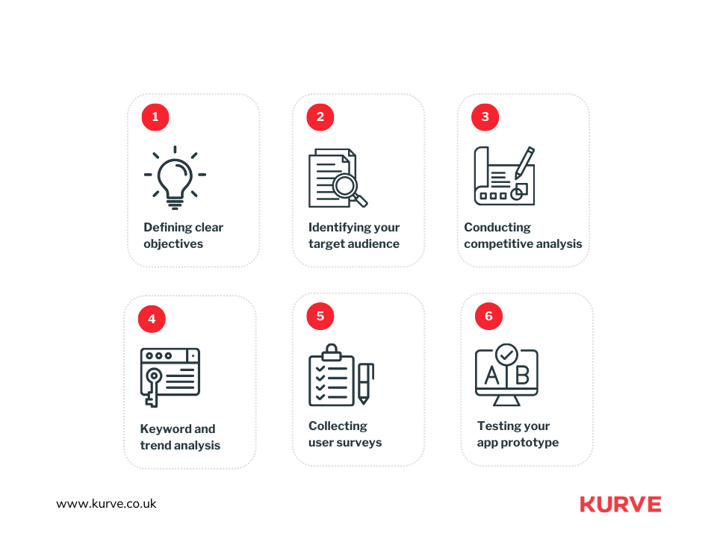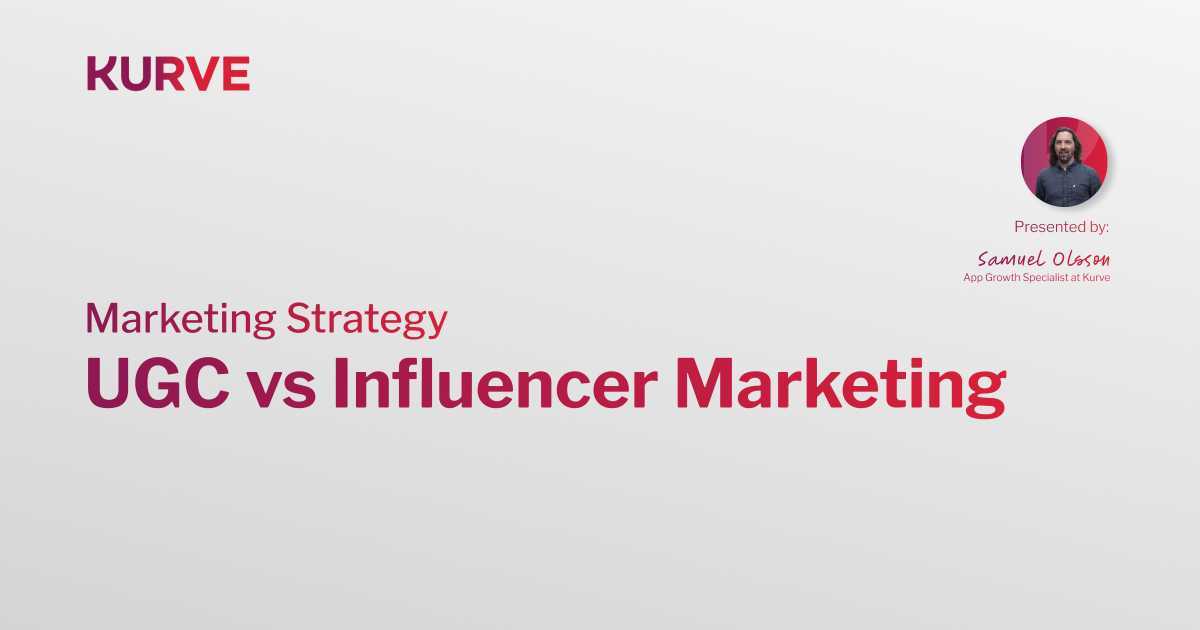How to Conduct Effective Mobile App Market Research | Kurve
In the ever-evolving landscape of mobile apps, conducting app market research is critical.
It ensures your mobile app idea fulfills a market need, appeals to the right audience, and succeeds. It should be an essential piece of your mobile app marketing strategy.
For those looking to transform their app concept into a fully realized product, Kurve offers comprehensive app development services to guide you from idea to launch.
This article will give you the keys to unlocking the power of market research. You'll learn to conduct market research to understand your target audience and market trends and perform competitor analysis.
So, let's dive in and get started.
What is Mobile App Market Research?
Think about the most successful apps out there. These companies didn't stumble upon success – they planned for it. They got to know their audience well and studied their competition.
Mobile app market research is understanding the app market. It's figuring out who your potential users are, what the current market trends are, and what your competitors are doing.
One key aspect of market research is getting to grips with current app market trends. Whether recognizing changes in how people use apps or incorporating the latest tech developments, market research keeps you in the loop and ahead of your competition.
If you want your app to succeed, you can't afford to skip market research. It gives you a complete overview to shape your app to stand out and appeal to your audience.
Type of Mobile App Market Research
There are two types of market research: Primary and secondary. Both have their purpose and can offer valuable insights.
.png?width=717&height=560&name=Two%20Types%20of%20Market%20Research%20(2).png)
Primary research gives you direct insights. You collect data firsthand from surveys, interviews, or focus groups, which allows for targeted and specific insights. But, it can be time-consuming and costly. Despite that, the direct feedback you get is often worth the extra effort.
Secondary research involves using existing data. It may come from reports, articles, or market studies that others have carried out. While it saves time and is cost-efficient, there is a trade-off. The studies are unlikely to be about your specific app, so they may not be relevant.
The type of research you choose depends on what you need. You'll use a mix of primary and secondary methods.
These research methods are part of your larger growth strategy. It's necessary to understand what procedures apply to your situation and use the proper research to inform these strategies.
Why is Mobile App Market Research Important?
Market research forms the backbone of your mobile app marketing strategy. It equips you with the knowledge to understand market dynamics and customer expectations better. It helps you determine what works and what doesn't and the opportunities you can seize to make your app shine amongst the competition.
It has three main benefits:
- Market research sets the groundwork for your app. It helps you understand your target audience, which informs your app design and features. This ensures your app resonates with user preferences, increasing satisfaction and boosting user retention.
- It reveals untapped opportunities. Market research can identify gaps in the market, giving you a competitive edge. Addressing consumer pain points increases the likelihood of your app's adoption.
- Research helps you plan marketing strategies. Positioning your app in the app store, identifying optimal keywords, and deciding on the best pricing model are all supported by solid market research.
Check out our in-depth blog post for practical steps on conducting app market research.
The Benefits of Conducting App Market Research
App market research guides your app's development and marketing path. There are plenty of rewards from performing market research yourself, from gaining a deeper understanding of your target audience to enhancing the user experience.
Let's dive into the main benefits of app market research.

Targeted Audience Understanding
Targeted audience understanding is vital for any mobile app. When you know your audience, you can create an app that meets their needs and preferences.
To understand your target market and users, consider conducting in-depth audience research, as our comprehensive guide suggests.
Competitive Advantage
Gaining a competitive advantage in the app market is crucial for success. By evaluating your competitors, you can identify their strengths and weaknesses, learn from their mistakes, and discover opportunities for differentiation.
Having distinct features and a unique value proposition will set your app apart. Understanding what competitors offer is essential to achieve this. To learn more about keeping an eye on your competition, check out this article.
Improved User Experience
In mobile app development, a key focus is improving the user experience. Developers can design an engaging and easy-to-use app by understanding user behavior and preferences. How do you gain this information? You guessed it -- from thorough research.
Knowing your users and focusing on their needs will result in a more intuitive, satisfying user experience. Check this informative blog for more on capitalizing on UX design in mobile apps.
Optimized Marketing Efforts
App market research plays a significant role in sharpening marketing strategies. It provides valuable insights into audience behavior, preferences, and trends. Armed with this knowledge, one can fine-tune marketing approaches for better engagement.
When you're ready to apply these insights to boost your app downloads, read this article. It provides in-depth strategies for capitalizing on research findings for effective app marketing strategies.
Reduced Risk of Failure
Conducting app market research reduces the risk of failure. You raise the chances of success by validating app ideas, understanding user needs, and fine-tuning features. With market research, developers are better equipped to create apps that resonate with users.
Want more insights on mitigating app failure risks through research? This article discusses strategies, emphasizing the importance of research in overcoming app development challenges.
6 Key Steps for Effective App Market Research
Let's dive into the six critical steps for effective app market research. These crucial stages are vital in ensuring the success of your mobile app. They comprise:

- Defining clear objectives
- Identifying your target audience
- Conducting competitive analysis
- Carrying out keyword and trend analysis
- Collecting user surveys and feedback
- Testing your app prototype
Each step is critical in optimizing your app development process, making it more likely to succeed in the competitive app landscape.
Explore this article for relevant insights on current app marketing trends. It offers valuable information that complements the app market research process.
Step 1: Define Clear Objectives
The first critical step in app market research is defining clear objectives. Before embarking on any research, clarifying what you aim to achieve is crucial.
Are you interested in learning about current market trends? Or you may want to understand the needs and preferences of potential users.
Whatever your goal, clear objectives act as a roadmap. They guide your research and ensure the information you gather is relevant and insightful.
Moreover, well-defined objectives are instrumental in formulating successful marketing strategies such as paid search. Paid search strategies, including pay-per-click (PPC) campaigns, need clear goals to be effective. Whether you aim to boost revenue, drive traffic, or enhance brand awareness, a well-planned objective will steer your initiatives in the right direction.
This helpful guide provides in-depth insights on creating a successful paid search strategy.
Step 2: Identify Your Target Audience
Step two in the app market research process emphasizes identifying your target audience. Knowing who the ideal users of your app are plays a significant role in ensuring its success. With a clear understanding of your user demographic, you can create an app that caters to their needs, priorities, and preferences.
Precise audience targeting involves comprehending users' behaviors, expectations, and pain points. This understanding paves the way for developing a relevant and effective app. In turn, it promotes user satisfaction, enhances app ratings, and leads to higher levels of download and engagement.
Effective targeting is intertwined with competitive analysis. Gleaning insights from competitors' growth strategies can help better understand your target audience. You can learn about who the users are and what their preferences and expectations from similar apps might be.
For additional insights on analyzing competitors' strategies for audience targeting, this article offers valuable information on the subject.
Step 3: Conduct Competitive Analysis
The third step in app market research involves conducting a competitive analysis. This step is more than knowing who your competitors are. It's about understanding their products, strategies, and customer interactions.
With in-depth competitive analysis, you can identify unmet market needs or discover features your app could innovate on. It gives you the necessary insights to differentiate your app, allowing you to fill in the gaps and provide a unique value proposition to your users.
The importance of this step extends to understanding your competition's growth strategies. Recognizing how other apps in the market strategize their growth can offer valuable insights for your strategy.
For a deeper understanding of growth strategies, add this article to your reading list.
Step 4: Keyword and Trend Analysis
The fourth step in app market research is keyword and trend analysis. Understanding the right keywords is fundamental in making your app discoverable on app stores. The power of keywords lies in identifying and comprehending how many people search for them. This phenomenon, "App Store Keyword Search Volume," is instrumental in driving user downloads.
There's more than meets the eye when it comes to keyword effectiveness. For instance, the term "home workouts" might be highly used in searches, indicating that many users are interested in this feature. Targeting high-volume keywords can increase your app's visibility in the search results, boosting its download potential.
Staying updated with trends in the mobile app industry is just as crucial. As market trends shift, so do user preferences and needs. Understanding these trends means you can tailor your app to align with the latest demands of users.
You can better understand how App Store Keyword Search Volume affects your app's growth here. The key is that effective use of keywords and trends in your strategy can improve your app's visibility and relevance.
Step 5: User Surveys and Feedback
In the fifth step of app market research, obtaining user feedback and conducting surveys rises to prominence. The feedback gives us a snapshot of what users seek in an app. It focuses on what's serving the users well and points us towards the areas where our app could improve.
Surveys are a dependable means for capturing this feedback. Tapping into users' preferences and identifying their pain points through surveys paves the way for an inside-out understanding of our user base. User responses reveal their experiences, app likes and dislikes and suggestions for improvement. They can become a treasure trove of directives for app creators.
Moreover, this accrued feedback transcends commentary. It reshapes into pivotal data that benefits the app development process. It provides an understanding of the user's journey, from when they discover the app to their decision to download or use it.
Feedback plays an integral role in optimizing the user journey. Acting on these insights, one can mold a more user-centric, intuitive app responsive to user needs. The result? An app on the track for success.
Step 6: Prototype Testing
The sixth and final step in the effective app market research process is prototype testing. Creating a prototype of your app and putting it through testing is crucial for enhancing the user experience and its functionalities.
Developing a prototype allows you to see potential areas for improvement and adjustments before an entire release. It validates your app ideas, simulates user interactions, and tests functionality in real-life scenarios. Feedback from prototype testing helps fine-tune your app, leading to an engaging and user-friendly design.
However, executing testing is essential to bring the desired benefits. In our guide on the critical components of a content strategy, we discuss the importance of testing within the context of user experience. Discover more about effective testing practices here.
Secure Your App Success Before You Even Build It!
Executing in-depth market research is pivotal for app development success. The process helps you;
- understand your target audience
- analyze your competition
- evaluate market trends
- identify monetization opportunities
- gather valuable user feedback through surveys
- prioritize testing your app prototype.
You can make informed decisions in your app development journey with these insights. We encourage you to incorporate the knowledge gained from effective app market research and propel your app towards success.
If you're looking to enhance your market research strategy, get in touch with Kurve for professional support and guidance


